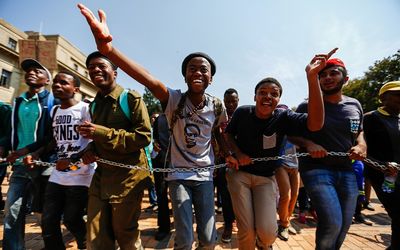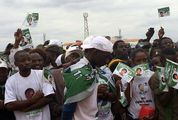Revolution is all the rage among angry student activists
by Roxanne Henderson
2016-08-18 09:28:24.0
WORDS like rage and revolution may have seemed outdated in a democratic SA‚ but this is no longer the case.
"We are living in different times‚" says Leigh-Ann Naidoo‚ an educationalist whose work on black intellectuals focuses on the new South African student movement.
Naidoo was speaking at the annual Ruth First Memorial Lecture‚ at the University of the Witwatersrand on Wednesday night‚ tackling the topic Violence and Rage in Recent Political Events.
"Running through the WhatsApp feeds of many of us in the student movement is the constant reference to revolution. Revolution peppers daily expressions of solidarity‚ discussions of national strategy‚ media interviews‚ and student activists’ descriptions of their actions and motivations.
"This language of revolution‚ of comradeship and war‚ of tactic and strategy‚ runs deep in the political life of the student movement. It is in the mouths of #RhodesMustFall students‚ anti-outsourcing student protesters in Tshwane‚ in the rallying of the new student Pan-Africanists. It is a striking fact that warrants some attention."
But the attention the revolution deserves was often undercut by golden oldies‚ who were quick to dismiss it‚ Naidoo said.
"I have heard them say over and over again‚ ‘we are not in a time of revolution’‚ as they shake their heads‚ knowingly. Or they say‚ with certainty‚ ‘you cannot justify such action because we are far from the conditions of revolution’‚ ‘it’s not the time for this or that because we are already in democracy’‚ ‘we have already achieved liberation’."
Naidoo said the actions of #FeesMustFall activists and other acts of occupation on campuses around the country may look like misguided madness to the older generation‚ but this was not the case:
"I want to argue that the comrades I have worked with in the student movement are not so much mad as they are time-travellers. Or rather‚ that their particular‚ beautiful madness is to have recognised and exploited the ambivalence of our historical moment to push into the future.
"They have seen things many have yet to see. They have been experimenting with hallucinating a new time."
Naidoo said‚ however‚ the new future the youth was dreaming up would not be accomplished without work. Instead the movement should engage in three tasks to achieve its goals.
The first was to "kill the fallacies of the present", including "the fantasy of the rainbow". The second task was to "arrest the present" and the third was to "open the door to another time".
Citing the acts of occupation by students on campuses in recent years‚ Naidoo said the movement was creating a new space and time. She added that students were experimenting with alternative forms of government‚ realising its current form had largely left it alienated from citizens.
"This is what makes the fight awkward and its violence obscene. They are supposed to know better. And we are supposed to learn from them.
"But when they use their bullets and teargas at the Union Buildings‚ when they spend their money on bringing private security companies on (to) campus‚ when they interdict us and suspend us and bring their expensive lawyers to put us down‚ one can but infer that the anti-apartheid generation has become afraid of the future.
"We have to recognise that the ruling elite‚ and in that I include the managements of our universities‚ have lost the capacity to dream us‚ to move us‚ into a new time. For you cannot bring a trespassing act from 1959 against students and think you have any relevance for a more just future."
Naidoo said the attitudes of our leaders towards the student movement had led to rage. "When they dismiss the student movement’s claim on the future‚ its experiment with time‚ when they belittle it‚ shoot it down‚ well‚ then pain becomes anger‚ anger becomes rage‚ even fire."
But Naidoo warned the student movement not to become trapped in this rage.
"If we are to be custodians of a future that will have dismantled the violence of the past and its stubborn hold on the present‚ then we cannot get stuck in a politics of shutdown. Shutting down is indeed necessary for the arresting of the present.
"But if we do not use the space that shutdown grants to work‚ seriously‚ on our vision of the future‚ if we do not allow ourselves‚ too‚ to be challenged and pushed‚ to read‚ and talk to each other‚ to work out our strategies‚ to doubt‚ and to find a vision of a future world in which the many oppressions that beset this one are in sight‚ then the door that we have opened will be closed again."
Arts journalist Lwandile Fikeni and radio producer Nolwazi Tusini also spoke at the lecture. They are both fellows of the University of the Witwatersrand’s Ruth First Fellowship.
TMG Digital

A faction of the #FeesMustFall movement, embarked on a protest at the Wits University, calling on non-exclusion of students based on their finance status, as 140 students were denied funding by FundSA Lushaka Funding, from the Department of Higher Education. Picture: MOELETSI MABE/THE TIMES
WORDS like rage and revolution may have seemed outdated in a democratic SA‚ but this is no longer the case.
"We are living in different times‚" says Leigh-Ann Naidoo‚ an educationalist whose work on black intellectuals focuses on the new South African student movement.
Naidoo was speaking at the annual Ruth First Memorial Lecture‚ at the University of the Witwatersrand on Wednesday night‚ tackling the topic Violence and Rage in Recent Political Events.
"Running through the WhatsApp feeds of many of us in the student movement is the constant reference to revolution. Revolution peppers daily expressions of solidarity‚ discussions of national strategy‚ media interviews‚ and student activists’ descriptions of their actions and motivations.
"This language of revolution‚ of comradeship and war‚ of tactic and strategy‚ runs deep in the political life of the student movement. It is in the mouths of #RhodesMustFall students‚ anti-outsourcing student protesters in Tshwane‚ in the rallying of the new student Pan-Africanists. It is a striking fact that warrants some attention."
But the attention the revolution deserves was often undercut by golden oldies‚ who were quick to dismiss it‚ Naidoo said.
"I have heard them say over and over again‚ ‘we are not in a time of revolution’‚ as they shake their heads‚ knowingly. Or they say‚ with certainty‚ ‘you cannot justify such action because we are far from the conditions of revolution’‚ ‘it’s not the time for this or that because we are already in democracy’‚ ‘we have already achieved liberation’."
Naidoo said the actions of #FeesMustFall activists and other acts of occupation on campuses around the country may look like misguided madness to the older generation‚ but this was not the case:
"I want to argue that the comrades I have worked with in the student movement are not so much mad as they are time-travellers. Or rather‚ that their particular‚ beautiful madness is to have recognised and exploited the ambivalence of our historical moment to push into the future.
"They have seen things many have yet to see. They have been experimenting with hallucinating a new time."
Naidoo said‚ however‚ the new future the youth was dreaming up would not be accomplished without work. Instead the movement should engage in three tasks to achieve its goals.
The first was to "kill the fallacies of the present", including "the fantasy of the rainbow". The second task was to "arrest the present" and the third was to "open the door to another time".
Citing the acts of occupation by students on campuses in recent years‚ Naidoo said the movement was creating a new space and time. She added that students were experimenting with alternative forms of government‚ realising its current form had largely left it alienated from citizens.
"This is what makes the fight awkward and its violence obscene. They are supposed to know better. And we are supposed to learn from them.
"But when they use their bullets and teargas at the Union Buildings‚ when they spend their money on bringing private security companies on (to) campus‚ when they interdict us and suspend us and bring their expensive lawyers to put us down‚ one can but infer that the anti-apartheid generation has become afraid of the future.
"We have to recognise that the ruling elite‚ and in that I include the managements of our universities‚ have lost the capacity to dream us‚ to move us‚ into a new time. For you cannot bring a trespassing act from 1959 against students and think you have any relevance for a more just future."
Naidoo said the attitudes of our leaders towards the student movement had led to rage. "When they dismiss the student movement’s claim on the future‚ its experiment with time‚ when they belittle it‚ shoot it down‚ well‚ then pain becomes anger‚ anger becomes rage‚ even fire."
But Naidoo warned the student movement not to become trapped in this rage.
"If we are to be custodians of a future that will have dismantled the violence of the past and its stubborn hold on the present‚ then we cannot get stuck in a politics of shutdown. Shutting down is indeed necessary for the arresting of the present.
"But if we do not use the space that shutdown grants to work‚ seriously‚ on our vision of the future‚ if we do not allow ourselves‚ too‚ to be challenged and pushed‚ to read‚ and talk to each other‚ to work out our strategies‚ to doubt‚ and to find a vision of a future world in which the many oppressions that beset this one are in sight‚ then the door that we have opened will be closed again."
Arts journalist Lwandile Fikeni and radio producer Nolwazi Tusini also spoke at the lecture. They are both fellows of the University of the Witwatersrand’s Ruth First Fellowship.
TMG Digital


















